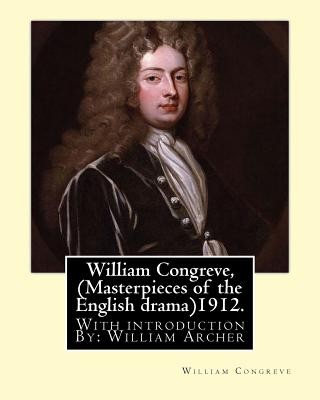
- We will send in 10–14 business days.
- Author: William Archer
- Publisher: CreateSpace Independent Publishing Platform
- Year: 2016
- Pages: 232
- ISBN-10: 153766378X
- ISBN-13: 9781537663784
- Format: 20.3 x 25.4 x 1.2 cm, minkšti viršeliai
- Language: English
- SAVE -10% with code: EXTRA
William Congreve, (Masterpieces of the English drama)1912. By (e-book) (used book) | bookbook.eu
Reviews
Description
William Congreve (24 January 1670 - 19 January 1729) was an English playwright and poet.William Congreve was born in Bardsey, West Yorkshire, England (near Leeds).His parents were William Congreve (1637-1708) and Mary (née Browning; 1636?-1715). The family moved to London in 1672. They relocated again in 1674 to the Irish port town of Youghal where his father served as a lieutenant in the British army. Congreve spent his childhood in Ireland, where his father, a Cavalier, had settled during the reign of Charles II. Congreve was educated at Kilkenny College where he met Jonathan Swift, who would be his friend for the remainder of his life; and at Trinity College in Dublin. Upon graduation, he matriculated in the Middle Temple in London to study law, but felt himself pulled toward literature, drama, and the fashionable life. Congreve assumed the pseudonym Cleophil and went on to publish a work he had written at the approximate age of 17 called Incognita: or, Love and Duty reconcil'd in 1692. This early work gained him recognition among the men of letters and an entrance into the literary world. Artistically, he became a disciple of John Dryden whom he met through the gatherings of literary circles held at Will's Coffeehouse in the Covent Garden District of London. John Dryden would continue to be a massive supporter of the works of Congreve throughout his life. This support would take the form of panegyrical introductions for some of Congreve's later works....... William Archer (23 September 1856 - 27 December 1924) was a Scottish critic and writer.He was born in Perth, the son of Thomas Archer. He spent large parts of his boyhood in Norway where he became acquainted with the works of Henrik Ibsen, and was later educated at the University of Edinburgh, where he received the degree of M.A. in 1876.rcher became a leader-writer on the Edinburgh Evening News in 1875, and after a year in Australia returned to Edinburgh. In 1878 he took up residence in London. In 1879 he became dramatic critic of the London Figaro, and in 1884 of the World, where he remained until 1905. In London he soon took a prominent literary place and exercised much influence.........
- Author: William Archer
- Publisher: CreateSpace Independent Publishing Platform
- Year: 2016
- Pages: 232
- ISBN-10: 153766378X
- ISBN-13: 9781537663784
- Format: 20.3 x 25.4 x 1.2 cm, minkšti viršeliai
- Language: English English
William Congreve (24 January 1670 - 19 January 1729) was an English playwright and poet.William Congreve was born in Bardsey, West Yorkshire, England (near Leeds).His parents were William Congreve (1637-1708) and Mary (née Browning; 1636?-1715). The family moved to London in 1672. They relocated again in 1674 to the Irish port town of Youghal where his father served as a lieutenant in the British army. Congreve spent his childhood in Ireland, where his father, a Cavalier, had settled during the reign of Charles II. Congreve was educated at Kilkenny College where he met Jonathan Swift, who would be his friend for the remainder of his life; and at Trinity College in Dublin. Upon graduation, he matriculated in the Middle Temple in London to study law, but felt himself pulled toward literature, drama, and the fashionable life. Congreve assumed the pseudonym Cleophil and went on to publish a work he had written at the approximate age of 17 called Incognita: or, Love and Duty reconcil'd in 1692. This early work gained him recognition among the men of letters and an entrance into the literary world. Artistically, he became a disciple of John Dryden whom he met through the gatherings of literary circles held at Will's Coffeehouse in the Covent Garden District of London. John Dryden would continue to be a massive supporter of the works of Congreve throughout his life. This support would take the form of panegyrical introductions for some of Congreve's later works....... William Archer (23 September 1856 - 27 December 1924) was a Scottish critic and writer.He was born in Perth, the son of Thomas Archer. He spent large parts of his boyhood in Norway where he became acquainted with the works of Henrik Ibsen, and was later educated at the University of Edinburgh, where he received the degree of M.A. in 1876.rcher became a leader-writer on the Edinburgh Evening News in 1875, and after a year in Australia returned to Edinburgh. In 1878 he took up residence in London. In 1879 he became dramatic critic of the London Figaro, and in 1884 of the World, where he remained until 1905. In London he soon took a prominent literary place and exercised much influence.........


Reviews